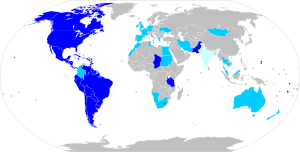
Back Turismo de parto Spanish زادگردی Persian Tourisme de naissance French 出産旅行 Japanese 원정 출산 Korean Turismo de parto Portuguese การท่องเที่ยวเพื่อคลอดบุตร Thai 生育旅行 Chinese
| Legal status of persons |
|---|
| Birthright |
| Nationality |
| Immigration |

Birth tourism is the practice of traveling to another country or city for the purpose of giving birth in that country. The main reason for birth tourism is to obtain citizenship for the child in a country with birthright citizenship (jus soli).[1] Such a child is sometimes called an "anchor baby" if their citizenship is intended to help their parents obtain permanent residency in the country. Other reasons for birth tourism include access to public schooling, healthcare, sponsorship for the parents in the future,[2] hedge against corruption and political instability in the children’s home country.[3] Popular destinations include the United States and Canada. Another target for birth tourism is Hong Kong, where some mainland Chinese citizens travel to give birth to gain right of abode for their children.
In an effort to discourage birth tourism, Australia, France, Pakistan, Germany, Ireland, New Zealand, South Africa, and the United Kingdom have modified their citizenship laws at different times, mostly by granting citizenship by birth only if at least one parent is a citizen of the country or a legal permanent resident who has lived in the country for several years. Germany has never granted unconditional birthright citizenship, but has traditionally used jus sanguinis, so, by giving up the requirement of at least one citizen parent, Germany has softened rather than tightened its citizenship laws.
Since the Twenty-seventh Amendment of the Constitution of Ireland was enacted in 2004, no European country presently grants unconditional birthright citizenship;[4][5] however, most countries in the Americas, e.g., the United States, Canada, Mexico, Argentina, and Brazil do so. In Africa, Chad, Lesotho and Tanzania grant unconditional birthright citizenship,[citation needed] as do some in the Asian-Pacific region including Fiji, Pakistan, and Tuvalu. [citation needed]
- ^ "Born in the U.S.A.: Birth tourists get instant U.S. citizenship for their newborns". NBC News. 7 March 2013. Retrieved 17 November 2023.
- ^ Grant, Tyler. "MADE IN AMERICA: MEDICAL TOURISM AND BIRTH TOURISM LEADING TO A LARGER BASE OF TRANSIENT CITIZENSHIP" (PDF). Virginia Journal of Social Policy & the Law. 22 (1). Archived from the original (PDF) on 14 April 2021. Retrieved 24 November 2020.
- ^ Cite error: The named reference
China Taiwan LSwas invoked but never defined (see the help page). - ^ Gilbertson, Greta (1 January 2006). "Citizenship in a Globalized World". Migration Policy Institute. Archived from the original on 15 December 2011. Retrieved 12 February 2012.
- ^ Vink, M.; de Groot, G.R. (2010). Birthright Citizenship: Trends and Regulations in Europe. Comparative Report RSCAS/EUDO-CIT-Comp. 2010/8 (PDF). Florence: EUDO Citizenship Observatory. p. 35. Archived from the original (PDF) on 26 November 2012. Retrieved 23 August 2012.